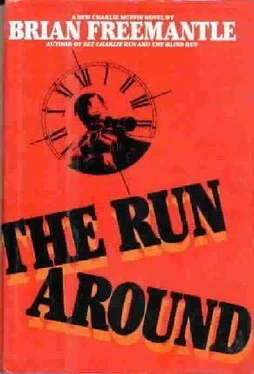Brian Freemantle - The Run Around
Здесь есть возможность читать онлайн «Brian Freemantle - The Run Around» весь текст электронной книги совершенно бесплатно (целиком полную версию без сокращений). В некоторых случаях можно слушать аудио, скачать через торрент в формате fb2 и присутствует краткое содержание. Жанр: Шпионский детектив, на английском языке. Описание произведения, (предисловие) а так же отзывы посетителей доступны на портале библиотеки ЛибКат.
- Название:The Run Around
- Автор:
- Жанр:
- Год:неизвестен
- ISBN:нет данных
- Рейтинг книги:3 / 5. Голосов: 1
-
Избранное:Добавить в избранное
- Отзывы:
-
Ваша оценка:
- 60
- 1
- 2
- 3
- 4
- 5
The Run Around: краткое содержание, описание и аннотация
Предлагаем к чтению аннотацию, описание, краткое содержание или предисловие (зависит от того, что написал сам автор книги «The Run Around»). Если вы не нашли необходимую информацию о книге — напишите в комментариях, мы постараемся отыскать её.
The Run Around — читать онлайн бесплатно полную книгу (весь текст) целиком
Ниже представлен текст книги, разбитый по страницам. Система сохранения места последней прочитанной страницы, позволяет с удобством читать онлайн бесплатно книгу «The Run Around», без необходимости каждый раз заново искать на чём Вы остановились. Поставьте закладку, и сможете в любой момент перейти на страницу, на которой закончили чтение.
Интервал:
Закладка:
Alexei Berenkov decided there could be greater advantage in conducting the initial re-interrogation of Edwin Sampson in the crushing surroundings of Potma Gulag 28, in which the man had been incarcerated for almost three years and in which he would be flinchingly aware of every penalty for every infraction. Berenkov was in a hurry and wanted the Englishman as immediately cooperative as possible: bringing Sampson back to Moscow’s Lefortovo jail or to the Serbsky Institute, where he had originally been broken, was something to be considered later, if he resisted. Berenkov could not image the man resisting, after what had happened in Lefortovo or Serbsky. Not unless his mind had gone, which was always a possibility.
Winter was already waiting, its warnings everywhere, and the helicopter had to fly low over the river to get beneath the cloud base. The machine was heated and in addition Berenkov was wearing a fur-lined topcoat and a momentarily discarded hat with fur-lined earflaps but he still shivered at the unrelieved, brittle-sharp greyness below: it was a monotonous moonscape of sameness, without a single break of colour as far as the eye could see. At the height at which they were flying it was possible to isolate the individual barracks and sheds, each guarded by control towers and additionally patrolled by foot squads with dogs. Occasionally there was a head-bent line of men shuffling automaton-like from one task to another, escorted by more dog-handling warders. Between every camp, virtually the thread through the buttonholes, entwined the river, not mud-brown from where he gazed down but black, the meandering and twisting link between it all.
Berenkov shivered again in horrified revulsion. He had believed English imprisonment appalling but found it difficult to find a word — or group of words — to describe or even compare it with what he was looking down upon. Not difficult, he thought, impossible. No words or phrase could adequately convey the awfulness of it. He thought of moonscape again: a place where life could not exist.
The pilot banked slightly higher and then circled Potma 28 and Berenkov saw the welcoming group already assembled, the helicopter landing cross appearing newly painted on a concrete area in the most outward of the concentric circles. The safest place, Berenkov remembered. The political prisoners were imprisoned in the very centre, with the urkas , the common criminals, terrorizing and raping and virtually acting as additional warders from their outer, encircling areas, in addition to the official guards. The last ring housed the least violent and so the least dangerous: if conditions could be better here they were better, the guard barracks and officers’ quarters more adequately heated, with proper kitchens and proper sanitation. Also — but most importantly — the officers and guards were immediate to the exit for a quick escape in the event of a riot by men too desperate or subhuman to be put down by dogs or machine-guns or flamethrowers or gas.
Berenkov had a confusion of impressions as he stepped down from the helicopter. The first was of the already biting cold and of ground so frozen that it rang strangely like metal beneath his feet. And then almost at once came another sensation, a memory he’d never wanted to recapture but more disgusting than he’d ever known, in Wormwood Scrubs. It was the stench of the worst sort of imprisonment and was no single smell. It was of decay and filth and rot, of animals and excrement and urine, of living things discarded and too long and too badly dying.
Berenkov tried to cough, to disguise the gagging that rose in his throat and almost failed, so that he came near to choking, but fortunately the rotor engines of the helicopter had not completely quietened, so nobody noticed.
‘Comrade General!’ greeted the camp commandant. He was a colonel named Slepov: he held himself stiffly to attention and actually saluted. Behind the man Berenkov saw ranged other camp officers, two majors and three lieutenants.
‘Comrade colonel,’ responded Berenkov. He did not bother to reply to the salute, nor to address himself to the escorting officers. ‘Everything is ready?’
‘My own office has been made available,’ said Slepov. Tentatively he moved away from the landing area, inviting Berenkov to accompany him, which Berenkov did.
‘That’s considerate,’ said Berenkov.
‘You will require some refreshment?’ invited the commandant, frightened at the reason for Berenkov’s visit and wanting to extend all the protective hospitality possible.
Berenkov still had a foul taste in his mouth from his reaction to the arrival smell and there was the need for preliminary discussion anyway. He said: ‘Perhaps something to drink. Flavoured vodka, preferably.’
‘We enjoy pepper vodka in this climate,’ said Slepov.
‘That will do excellently,’ said Berenkov.
As they approached the officers’ quarters, Berenkov was aware of the attention from the outer ring of prisoner barracks, recognizing the professionalism of the institutionalized in which he had once been so expert himself, the ability to react to something as earth-shatteringly unusual as a helicopter arrival would be to them but at the same time showing nothing in that reaction to offend or infringe prison regulations to incur any sort of penalty.
The officers’ quarters were raised on supports from the freezing ground and almost oppressively warm, in contrast to the outside temperature. There were a series of pot-bellied stoves running down the centre of the large, outside office block and additional central heating radiators beneath windows which Berenkov saw were double-glazed and additionally heavily curtained. Slepov’s office was carpeted and an attempt had been made at a conference area to one side, with easy chairs and a couch and a rectangular table. The bottles were already prepared on the table. Slepov poured and Berenkov sank the first drink in one gulp, needing it: it burned through him, warming as it was supposed to do and taking some of the earlier taste from his mouth. Berenkov accepted a second and as he handed it to him Slepov said, exploring: ‘It is not often that we have a visit from a KGB general?’
‘It is only the Englishman, Sampson,’ said Berenkov, getting the man’s fears out of the way at once.
‘I have him waiting,’ said the commandant.
The man started towards the intercom device on his desk but Berenkov stopped him. ‘Wait!’ he ordered. ‘You have informers in his block?’
‘Three,’ confirmed Slepov.
‘Reliable?’
‘They know better than not to be.’
‘What do they report on him?’
‘Very little,’ said Slepov, uncomfortably. ‘He has not formed any particular friendships, certainly nothing homosexual. In the first month of his imprisonment he broke another prisoner’s nose, fighting off a rape attempt.’
‘No boasts?’ demanded Berenkov.
‘Boasts?’ queried Slepov, bewildered.
‘There have been no remarks about his succeeding, in whatever his mission was in coming to Moscow?’
‘Nothing,’ assured Slepov. ‘If there had been I would have reported it at once.’
‘Let me see him,’ ordered Berenkov.
The man with whom Charlie Muffin supposedly fled to Russia, after their KGB-engineered escape from Wormwood Scrubs, was led into the commandant’s office within minutes and Berenkov guessed he had been held in one of the outside offices. Edwin Sampson was wearing a grey canvas prison suit stiff with age and use and work boots around which were wrapped strips of cloth, for additional warmth. Both ankles were manacled and linked by a short chain, so that he could only walk with short, scuffing steps, and from the centre of that chain extended a longer metal link to another short chain between a set of handcuffs that held his hands, horny with callouses, close together and tight to his waist. His head was shaved bald against lice infestation, and his skin was tight across his cheekbones and chin. The skin was yellowed by exposure, different only where his eyes sank deeply into his head, where it was oddly black. His stance, between the two escorting guards, was stiffly respectful but docile, the attitude of someone determined against any offence that might earn retribution.
Читать дальшеИнтервал:
Закладка:
Похожие книги на «The Run Around»
Представляем Вашему вниманию похожие книги на «The Run Around» списком для выбора. Мы отобрали схожую по названию и смыслу литературу в надежде предоставить читателям больше вариантов отыскать новые, интересные, ещё непрочитанные произведения.
Обсуждение, отзывы о книге «The Run Around» и просто собственные мнения читателей. Оставьте ваши комментарии, напишите, что Вы думаете о произведении, его смысле или главных героях. Укажите что конкретно понравилось, а что нет, и почему Вы так считаете.












